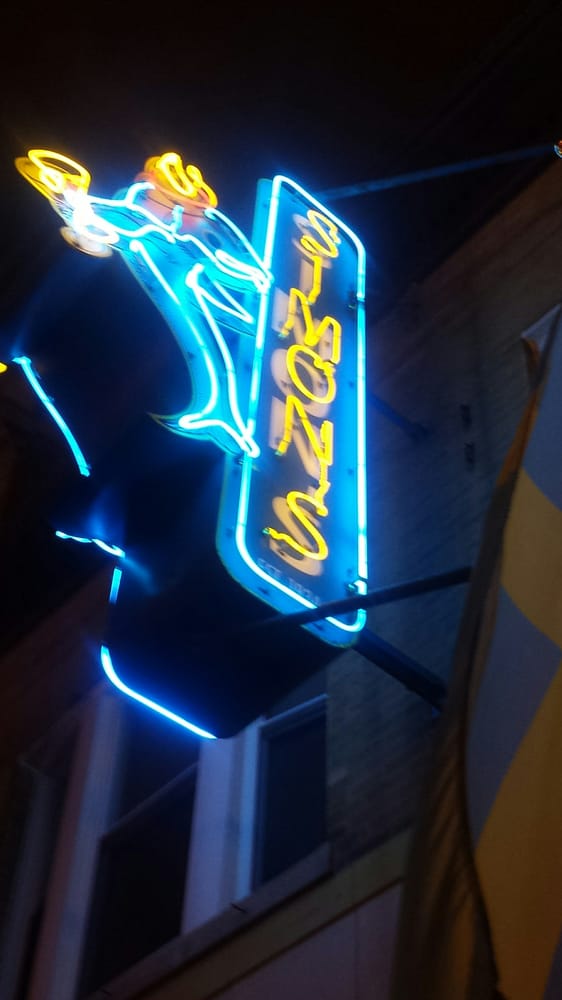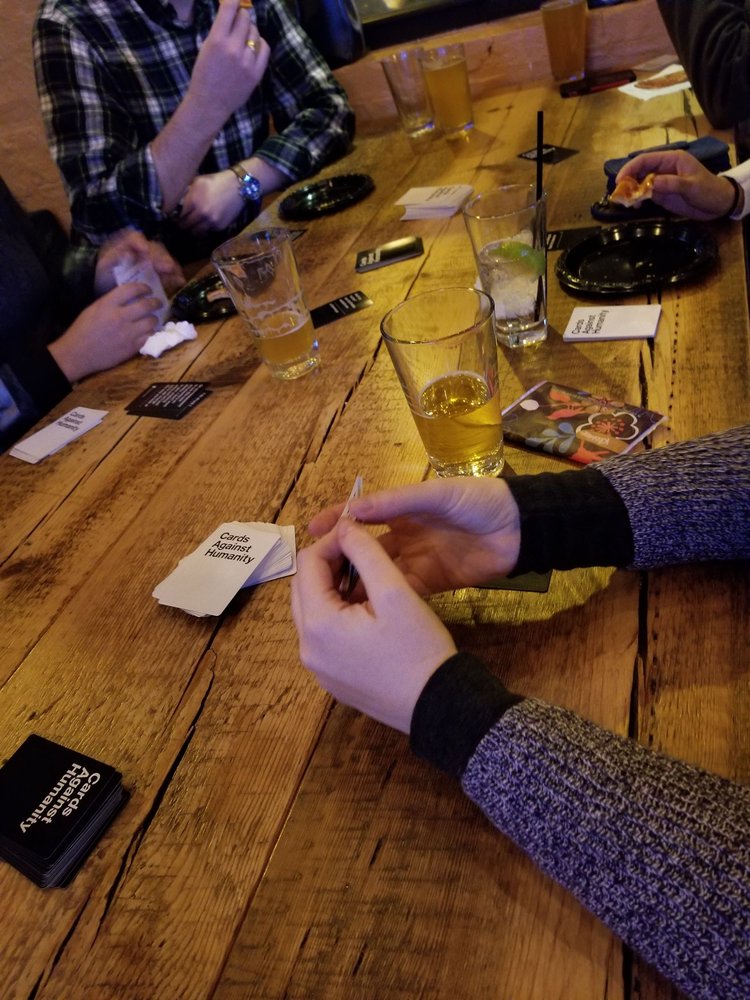The first thing Blake Karlson did to promote his record label Chicago Research was head to what he calls “the most haunted cemetery in the United States.” Hidden in Rubio Woods Forest Preserve in the southwest suburbs, Bachelor’s Grove Cemetery has been a nexus for spooky apparitions since at least the 1950s, according to Matt Hucke and Ursula Bielski’s 1999 book, Graveyards of Chicago. Witnesses have reported seeing flashing lights, a house that would appear and disappear without a trace, a man with two heads, mysterious hooded figures, and a woman cloaked in white. The satanic panic even came early to Bachelor’s Grove: though fears of shadowy devil-worshipping cults didn’t become widespread in the U.S. till the 80s, similar anxieties gripped the communities around the cemetery in the 70s, after vandals dug up graves and left animal remains scattered around.
One year ago, Karlson took a camera and a friend (who records as the Arno) to Bachelor’s Grove. He already knew that he wanted Chicago Research to focus on postpunk, industrial, and eccentric electronic music, and the sublimely eerie sounds he loves made a perfect match for a graveyard that’s frightened Illinoisans for nearly a century.
A silent loop of the footage, so pixelated that it sometimes degenerates into a gray and brown haze, was the centerpiece of the front page of the label’s website, which Karlson retired last week (the video can still be seen at the @chicago_research Instagram page, where it’s the first post). The Arno skulks through the desolate cemetery in a black trench coat, sometimes hitting a large metal spring with a rod–it looks like a cryptid hunter’s footage of the lost member of Einsturzende Neubauten. “We were just trying to make some weird video to put out, but it ended up being a little goofy,” Karlson says. “I tried to make it less goofy, but I still like it.”
The only other things on the label’s website are links to Bandcamp. Chicago Research launched with two releases in February 2019: Natural History, a compilation of deranged, distorted electro-punk from a solo project called Understudy, and CR001, a label sampler that features synth-pop artist Death Valley, rowdy postpunks Bruised, noise hypnotist Hen of the Woods, industrial surrealists Civic Center, and Joy Division worshippers Product KF. Since then, the Chicago Research catalog has ballooned rapidly: its total number of releases hit 23 last month, when EBM act Club Music released the digital version of Beyond New Beat. When I visit Karlson at his Humboldt Park home on Wednesday, February 13, about a week after the album’s release, he’s getting ready to dub it onto 100 pink cassettes he’d received that day.
The large, shabby house that Karlson shares with a crowd of roommates doubles as Chicago Research’s headquarters. He records musicians in his bedroom, using his closet as a vocal booth. In the second-floor living room, he and his collaborators make flyers or assemble cassettes for mail orders. In the basement Karlson stores his supply of cardboard record mailers, which he also uses to sell used records online (the closest thing he has to a day job). Including the people in the coach house out back, he has eight roommates, and some of them pitch in with Chicago Research work. One of them, Cesar Robles, helps design the label’s releases, fronts Bruised, and plays in EBM outfit Conjunto Primitivo; before Karlson’s group Product KF went on hiatus, he played guitar with them too.
Karlson makes the curatorial decisions for Chicago Research, and he carries the financial burden of running it. But in many other ways, the label is a collective–the main factor that unifies the sonically disparate acts that it’s released, aside from their shared antagonistic aesthetic, is that they’re all part of the same friend circle.
American Dreams Records showcase featuring Forest Management, Jordan Reyes, Civic Center, and Itsi
Wed 3/4, 9:30 PM, Hideout, 1354 W. Wabansia, $8, 21+
Automelodi, Fee Lion, Club Music
Sun 3/8, 9 PM, Sleeping Village, 3734 W. Belmont, $12, $10 in advance, 21+
Chicago Research one-year party featuring Club Music, Conjunto Primitivo, the Arno, Breastmilk, Oro, and DJ Don Crescendo
E-mail [email protected] for location. Fri 3/13, 8 PM, donations accepted, all ages
These connections preexist the label too. A few years ago, Karlson played in synth-punk band Plastic with Macklin Reed (of Bruised and Product KF) and Ariel Motto (aka Death Valley and Club Music). Between them, Karlson, Reed, and Motto have contributed to 14 Chicago Research releases so far. “The main goal is just to document what’s going on,” Karlson says. “I’m just doing this for us, for the people here.”
Chicago Research releases have hardly been burning up the charts, but the label’s prolific release schedule and range of unusual sounds have made lots of fans in the local underground electronic scene. Cult producer Beau Wanzer got hooked after stumbling on the label’s Bandcamp page in early 2019. “The combination of experimental, industrial, noise, punk–all those things that I love–that was what drew me to it,” he says. He’s since booked a few Chicago Research artists for Hot on the Heels, the outre electronics monthly he’s hosted at Danny’s for 14 years; Understudy performed in May, and last month the Arno played a live set while Karlson spun records.
“Their enthusiasm makes me an enthusiast as well,” Wanzer says. “They’re obviously younger than me–they’re just starting out–and with the amount of stuff they’ve already released within just a year, I’m just really happy that they’re pushing, pushing, pushing. It makes me very proud to have a Chicago label that has really contributed a lot to the scene.”
Karlson guesses that a Chicago Research artist performs somewhere in town at least once per month, but March is shaping up to be especially busy. Civic Center are part of an American Dreams Records showcase at the Hideout on Wednesday, March 4, and Club Music opens for Montreal darkwave duo Automelodi at Sleeping Village on Sunday, March 8. On Friday, March 13, Chicago Research hosts a first-anniversary showcase at a DIY space with five acts who’ve each released at least one song on the label. The concert doubles as a birthday party for Karlson, who turns 26 that day.
“Chicago Research, the label, gave us a point that we could all coalesce around and all deposit our energies into,” says the Arno. The label’s artists invest in their connections to the collective, not just in their individual projects. Karlson has been critical to making the endeavor work, encouraging his friends to focus on their music while he handles the logistics. “A lot of our crew is left-brained and insane people,” the Arno says. “It’s nice to have a daddy shepherding the whole thing along.”
Karlson grew up in Aurora, and his dad brought him to his first punk shows when he was in third grade. “He took me to see Rancid and NoFX and stuff,” Karlson says. “He was big on those bands in the early 2000s.” Once Karlson got acquainted with the DIY scene, he’d take the Metra into Chicago to see shows. “When I was 18, I would come down here to see bands like Culo,” he says. “That’s when I really started becoming active.”
In the early 2010s, Karlson started his first band, a short-lived hardcore outfit that fizzled out after self-releasing a couple cassettes. His most prominent band in that scene was a lumbering unit called 86 Gemini, which also featured Macklin Reed. In 2017 they issued a self-titled seven-inch on High Fashion Industries, a DIY label run by Eric Frankel of heavy hitters Rash. “He’s probably got a lot of those left,” Karlson says.
Karlson played a critical role in Chicago hardcore as a recording engineer. He learned the basics while in high school, at a west suburban church his family attended–but he’s forgotten the name of the church and the name of the person who showed him the ropes. “He would send me home with textbooks on EQing,” Karlson says. “I’d go to church every Sunday, ’cause he taught me for free.” At Harold Washington College (one of four schools he attended) he took an elective on Pro Tools, which he still uses to record bands.
In July 2014, Karlson posted to the Facebook group DIY Chicago with an offer to record bands for free. “So stupid–I was young,” he says. He recorded a streak of Chicagoland hardcore acts, including Scary & the Scrapers, the Wrong, and Tigress (he worked on their 2016 self-titled seven-inch, which came out on critical local punk label Not Normal). Karlson’s post also reached Robles, who’d been looking for someone to record Bruised. “He’s been recording us ever since, everything we’ve put out,” Robles says.
At first Robles didn’t spend much time with Karlson outside of Bruised recording sessions. But in 2016, they got to know each other better after Robles joined 86 Gemini on guitar–they especially bonded on a west-coast tour. “I spent a lot of time in the van with him,” Robles says. “I think we became pretty close friends after that.” About a year later, Robles moved into Karlson’s house.
Also in 2016, Reed and Karlson were looking for a new synth player for their other band, the Screamers-inspired outfit Plastic. They reached out to Ariel Motto, who’d played synth in the live lineup of Mark Plant’s postpunk band Military Police and a Devo-influenced Northwest Indiana group called Manneqin. Karlson and Reed wanted Plastic to tour a lot, and Motto was on board. “That’s the most rewarding part of being a musician–getting to perform a lot and getting the opportunity to tour,” she says. “I just didn’t have a lot going on; I needed something to fill my time. I wasn’t working–it was a really dull summer.”
Plastic lasted another year and a half, during which time Saint Louis punk label Lumpy Records reissued their 2016 debut, Plastic 2.0. Motto moved to Bloomington, Indiana, and started recording solo darkwave material as Death Valley. In April 2017, she released two singles on Bandcamp. “Blake was really supportive from day one,” Motto says. “He said, ‘If I was doing a record label, I would want to release the single as a seven-inch.'”
Karlson actually was running a label at the time, but it stuck mainly to reissues–its only original release was Plastic 2.0. He called it Animated Music (the same name he now uses to sell used records online), and he ran it from 2016 till 2018. Its three reissues included a jaunty 1981 synth-pop single that former Gary Numan keyboardist Chris Payne had recorded as the Electronic Circus.
Animated Music’s biggest project was also its biggest headache: a double LP of a 2008 cult album by Houston rapper Viper entitled You’ll Cowards Don’t Even Smoke Crack. “We had the contract, and then this other label announced a reissue of it at the same time,” Karlson says. “I’m trying to work out how me and the other label can both sell 500 records, and then Viper announces a reissue of his own. So now I’m thinking there’s gonna be three pressings, and I’m like, ‘Holy shit, I’m gonna be $8,000 in the hole–how am I gonna move any of this stuff?'” The Animated reissue took a year of work, but once it came out in September 2018, it sold out quickly.
Despite that success, Karlson stopped doing reissues after You’ll Cowards. He found the process too transactional and emotionally cold, and besides, his friends were making vital new music that nobody else seemed to want to release. “We spent almost a year recording a Bruised album, and then the label that was gonna put it out was like, ‘Ehh,'” Karlson says. “Ariel Motto had some stuff, and Product KF pretty much had an album. It’s necessity–no one’s gonna put out our record, so we might as well.”
Karlson arrived at this conclusion in December 2018 and wasted no time setting up his new label. He derived the name from Manhattan Research, a technology company founded by influential composer and electronics pioneer Raymond Scott. Karlson asked Robles to design a black-and-white logo that stylized the sunbeams shining through the windows of Union Station’s Great Hall, reimagining them as long spikes.
“I honestly didn’t really like that image at first,” Robles says. “But it’s grown on me a lot. I’m glad he insisted on that. He knows what he likes.” Robles and Karlson later realized that the Union Station windows appear in the artwork for a touchstone of the coldwave and synth-pop scenes: Ministry’s 1981 debut single, “I’m Falling” b/w “Cold Life.”
Karlson has a strong and specific aesthetic, and he often makes it felt in the music his friends make for Chicago Research–especially on the releases he records, such as the Arno’s debut cassette, April’s Ways of Perfection. “In some ways we wrote a lot of that music together, or at least he helped me make editorial decisions,” the Arno says. “I would make this noise or that noise, and we’d constantly be having this dialogue of, ‘Do you like this? Do you not like this? Is this too weird? Is this not weird enough? Should I push this more? Let me push this more. Let me make this more fucked-up.’ Sitting in his tiny little cubicle bedroom, recording this stuff, I think it fostered a really strong, collaborative relationship.”
Chicago Research also helped convince Motto to move back to Chicago. Karlson told her about the label after she booked Product KF and Understudy for a show at her Bloomington house. “It felt like an opportune time to come here, write and record a lot of music, and play a lot of shows alongside similarly minded friends,” Motto says. “There were definitely opportunities to collaborate on the table, and do and create a lot of great things.”
Motto moved back to Chicago about a year ago, and since then she’s spent a lot of time recording in her apartment–she’s released three Club Music cassettes since August. She prefers to handle every aspect of the recording process herself, but she credits Karlson with providing crucial moral support. “Blake has a knack for pushing his friends creatively, and pushing them to do the things that they want to do and take their projects to the next level–he’s done that for me,” Motto says. “I was sort of stagnating creatively for a while–this was before I started recording as Club Music, and I still was focusing on Death Valley. I was feeling kind of lost, and I was unsure of what direction I wanted to take that project, or if I even wanted to keep doing it at all. If it weren’t for his encouragement, I don’t know if I would’ve released the music.”
Karlson has released his own music on Chicago Research not just in Product KF but also with Civic Center and as Lily the Fields. He started Civic Center, a trio project with the solo musicians who record as Understudy and Hen of the Woods, around the same time he started Chicago Research, and they’ve put out three tapes and a double-cassette compilation so far. “It worked out really well–we can churn out albums pretty quick, it turns out,” Karlson says.
This summer, Civic Center will release an album through American Dreams Records, the experimental label of musician and Reader contributor Jordan Reyes. He discovered Chicago Research after seeing Product KF open for French coldwave group Trisomie 21 at the Empty Bottle in March 2019. The more he learned about Karlson and Chicago Research, the more impressed he was.
“There was a clear aesthetic and dedication to the music, and so much of it came from trusting his friends to fulfill creative obligations,” Reyes says. He likens Chicago Research to a family operation. “I think that that’s optimal for creativity,” he says. “They’re not Wu-Tang Clan, but it reminds me of Wu-Tang Clan, the way that it was done–allowing there to be these centralized organizations, and then also giving people the opportunity to do their own thing. I thought that was just really cool.”
Reyes later wrote a profile of the label, which Bandcamp Daily published in August under the headline “Chicago Research is Building a New Home for Industrial Music in the Midwest.” After the story ran, Karlson asked Reyes about releasing a Civic Center album on American Dreams; the band met with Reyes at Falafel & Grill in Wicker Park to talk it over.
“A couple of the other cats from the Chicago Research crew came too,” Reyes says. “You sign someone, it’s like a marriage–you get to be a part of the family. Everyone’s involved. It’s a really interesting thing to feel, even more than it is to see.”
On a recent trip to New York City, Wanzer stopped by boutique record shop 2 Bridges and spotted a spread of Chicago Research cassettes. “I was like, ‘Oh, this is great–I’m really excited that there are people paying attention to Chicago underground music,'” Wanzer says. “In terms of national attention in general, I feel like Chicago’s still under the radar, more or less.”
Karlson has also heard from nonlocals attracted to Chicago Research’s bizarre electronic sounds, some of whom apparently haven’t picked up on the label’s premise and ask him to release their music. “I had a guy from Japan hit me up–he had some techno stuff,” Karlson says. “I was like, ‘This is good, but sorry, I’m only doing Chicago stuff.’ Maybe far in the future I would venture, but right now I’ve got enough on my plate in Chicago.”
Drew Ryan, who’s booked Chicago Research acts at the Owl for his monthly experimental series Neobeat, sees the label’s strength as its community. “It’s nice to see someone’s taking the time to put something out there, to give it an identity and give it a home to live in,” Ryan says. “There’s more of a sense of culture and the people behind it, rather than if Hen of the Woods or Civic Center were just to put out a record by themselves on Bandcamp or something that didn’t really feel like part of this mass. Chicago Research gives it a little bit more weight.”
The label releases cassettes and records sporadically, usually in groups of two or three. Since September it has also run a more or less weekly mix series, posting material from members of the collective to Mixcloud. Karlson never wants Chicago Research to fall silent for long, because he knows how easy it is to lose an audience’s attention. “If you’re not churning stuff out now, in a month no one’s gonna give a shit–if you’re not reminding people that you’re here,” he says. “There’s just so much stuff everywhere.”
For now at least, nobody in the city’s experimental electronic and industrial scenes is likely to forget about Chicago Research. The musicians involved take up a lot of space, especially given the way they work together. “Now that we’ve kind of established the sound and the visual language, I’d like to see who else also fits into that or is interested in being a part of it,” Robles says. “You know, outside my friends.” v
Read More
































